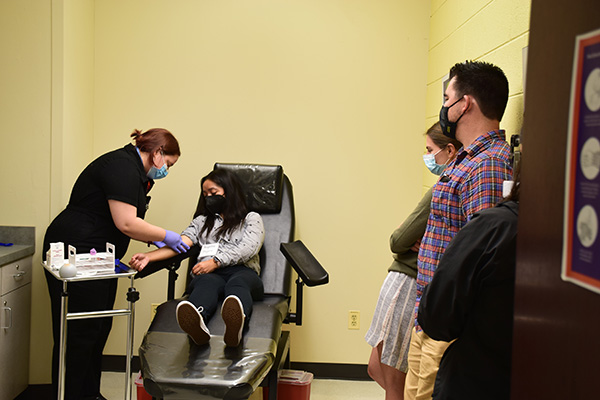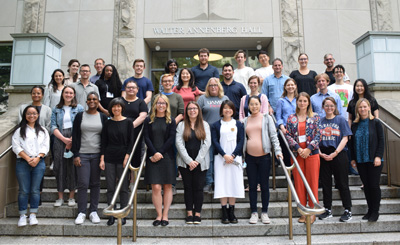What Can Biosocial Approaches Reveal About Human Biology and Experience?
IPR experts train 30 social science researchers in the latest methods
Get all our news
It was wonderful to be in person with so many thoughtful social scientists. The event left me feeling very optimistic about the promise of and prospects for biosocial science.”
Greg Miller
IPR health psychologist

SIBASS participants practiced biological approaches to research, such as learning how to draw blood.
Do poverty and racism affect your health? If so, what are the best methods for measuring the effects? And what are the policy and ethical implications of doing so?
Social scientists now have tools to better trace such questions about how social, economic, and cultural contexts affect physical and mental health, but relatively few know how to use them effectively.
“I wanted to learn from people who’ve been doing biosocial research for many years and understand both the logistical and scientific challenges that can come with doing this work,” said Sarah Vogel, a PhD student studying developmental psychology at New York University.
Vogel was one of 30 PhD students, postdoctoral fellows, and junior faculty who attended an interdisciplinary workshop led by IPR pioneers in the use of biomarkers, which are measures of biological processes and health. It took place from June 6–10 on Northwestern University’s Evanston campus.
“We had a terrific week of learning together, with lots of stimulating dialogue between the faculty and trainees,” said IPR health psychologist Greg Miller, who organized the Summer Institute on Biological Approaches in the Social Sciences (SIBASS) with support from the Russell Sage Foundation, JPB Foundation, and IPR. “The event left me feeling very optimistic about the promise of and prospects for biosocial science.”
He said it was great to be back in person “with so many thoughtful social scientists” for the workshop, which had been on hiatus since it was last held in 2019 due to the pandemic.
The session topics included basic information about how the body’s main systems work and respond to social problems, and how to incorporate the study of the brain into biosocial research. Participants also debated the challenges and rewards of biosocial research and the social, ethical, and political considerations of conducting it.
Angelina Majeno, a PhD student studying psychological science at the University of California, Irvine, said the sessions offered lessons for everyone and promoted interdisciplinary collaboration. But Majeno said it’s challenging to work across disciplines to access new information about biomarkers.
“When we’re in our respective disciplines, everybody goes into jargon mode, and a lot of times, that’s not very accessible,” she said. “If you want to learn about a new field, it is really hard to do that, especially as a graduate student.”
Hearing from Miller and the other faculty gave Majeno, who examines how social and cultural stressors affect health inequities in adolescents and young adults, more context about biomarkers and other topics and methods. For example, she learned more about using electroencephalography (EEG) for sleep research.

Thirty participants attended the SIBASS workshop.
The sessions also guided participants through hands-on exercises, such as analyzing dried blood spots for markers of stress and collecting saliva to understand cortisol patterns. Cortisol is a stress hormone tied to various adverse health conditions. Vogel said the exercises helped her consider the requests researchers ask of study participants and how to minimize the stress those requests may put on participants.
“When I collect biospecimens from my participants, this is what I’m asking the people that I work with, so it was scientifically very cool, but also made me think about participant burden in a different way,” Vogel said.
Vogel explores how stress and socioeconomic disadvantage influence children’s cognitive development, and she applied to SIBASS to prepare for her dissertation.
“I found [SIBASS] to be hands down one of the most rewarding and educational professional development experiences of my career,” Vogel said.
SIBASS developed from the IPR Summer Biomarker Institute, created by developmental psychobiologist Emma Adam and anthropologists Christopher Kuzawa and Thomas McDade, which ran from 2006–11.
Miller co-led the workshop with these three and other pioneers in the development and deployment of biomarkers: IPR health psychologist Edith Chen, IPR psychologist Robin Nusslock, and developmental psychologist and IPR associate Claudia Haase. Other faculty included Bridget Goosby of the University of Texas at Austin, Michael Kobor of the University of British Columbia, and Michael Yudell of Arizona State University.
Emma Adam is Edwina S. Tarry Professor of Human Development and Social Policy and an IPR fellow. Edith Chen is John D. and Catherine T. MacArthur Chair and Professor of Psychology and an IPR fellow. Claudia Haase is associate professor of human development and social policy and of psychology and an IPR associate. Christopher Kuzawa is John D. MacArthur Professor of Anthropology and an IPR fellow. Thomas McDade is the Carlos Montezuma Professor of Anthropology and an IPR fellow. Greg Miller is the Louis W. Menk Professor of Psychology and an IPR fellow. Robin Nusslock is an associate professor of psychology and an IPR fellow.
Image credits: IPR, J. Guillen
Published: July 8, 2022.


